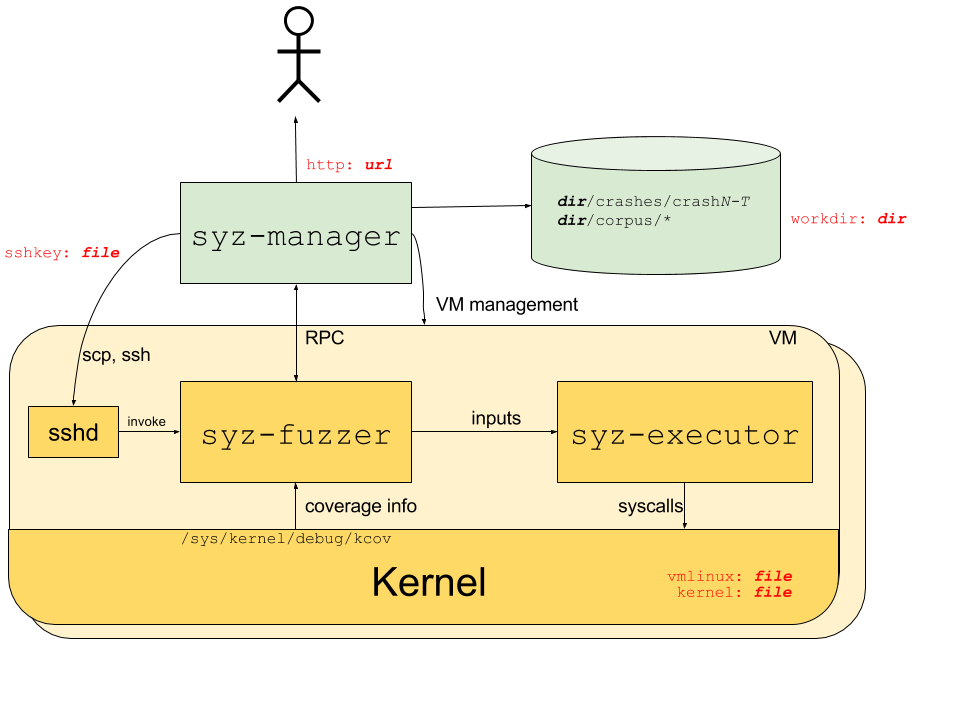Some explanation of code logic in syzkaller
Main code logic of syzkaller
All the code in the following is in the version : dce6e62ffce4b315ab41407813f0257ced29903f
The main logic of syzkaller is as follows, borrowed from internals.md.

manager.go
flagConfig = flag.String("config", "", "configuration file")
flagDebug = flag.Bool("debug", false, "dump all VM output to console")
flagBench = flag.String("bench", "", "write execution statistics into this file periodically")
In main function, it first prepares something and then run manager in the previous figure.
In L117, I am not very sure about the meaning of maxLine - 1000. Originally I think it’s the length of output log, but it seems incorrect.
In L130, it calls PraseEnabledSyscalls to parse enabled syscalls from the configuration file.
Then control flow comes to RunManager(manager.go:137). Next is vmLoop(manager.go:287). In L346, it calls repro.Run to reproduce the queue of crashes that need to reproduce - reproQueue. It should be noted that this is exactly the same callsite with syz-repro tool.
So when fuzzer is started to fuzzing the corresponding kernel? The answer is in manager.go:L356.
go func() {
crash, err := mgr.runInstance(idx)
runDone <- &RunResult{idx, crash, err}
}()
The actual code of mgr.runInstance is in the manager.go:508. It would complete the following tasks:
- create one vm
- setup port forwarding
- copy fuzzer and executor binary
- start fuzzer binary and moniter its execution
Code logic of fuzzer
Next, let me show some brief introduction to the logic of fuzzer.
In the main function of fuzzer.go, it inits and calls prog.loop() according to the flagProcs (flagProcs specified by user).
for pid := 0; pid < *flagProcs; pid++ {
proc, err := newProc(fuzzer, pid)
if err != nil {
log.Fatalf("failed to create proc: %v", err)
}
fuzzer.procs = append(fuzzer.procs, proc)
go proc.loop()
}
The loop() is in syz-fuzzer/proc.go. It generates or mutates syscall sequences and calls proc.execute send data to executor to run syscalls.
func (proc *Proc) loop() {
......
for i := 0; ; i++ {
......
ct := proc.fuzzer.choiceTable
corpus := proc.fuzzer.corpusSnapshot()
if len(corpus) == 0 || i%generatePeriod == 0 {
// Generate a new prog.
p := proc.fuzzer.target.Generate(proc.rnd, programLength, ct)
log.Logf(1, "#%v: generated", proc.pid)
proc.execute(proc.execOpts, p, ProgNormal, StatGenerate)
} else {
// Mutate an existing prog.
p := corpus[proc.rnd.Intn(len(corpus))].Clone()
p.Mutate(proc.rnd, programLength, ct, corpus)
log.Logf(1, "#%v: mutated", proc.pid)
proc.execute(proc.execOpts, p, ProgNormal, StatFuzz)
}
}
}
The proc.execute execute chain is as follows:
proc.execute -> executeRaw -> env.Exec. And env.Exec is defined in the ipc.go. So the same process as syz-execproc.